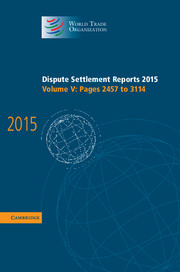India - Measures Concerning the Importation of Certain Agricultural Products (WT/DS430): Report of the Appellate Body
Published online by Cambridge University Press: 28 September 2017
Summary
INTRODUCTION
India appeals certain issues of law and legal interpretations developed in the Panel Report, India – Measures Concerning the Importation of CertainAgricultural Products (Panel Report). The Panel was established to consider a complaint by the United States with respect to measures taken by India concerning the importation of certain agricultural products.
This dispute concerns measures consisting of prohibitions that India imposes on the importation of various agricultural products, primarily poultry products, because of concerns related to avian influenza (AI). India maintains its AI measures through two legal instruments – The Live-Stock Importation Act, as amended (Livestock Act), and Statutory Order 1663(E) (S.O. 1663(E)).
AI, also commonly known as “avian flu” or “bird flu”, is “an infectious viral disease of birds (especially wild water fowl such as ducks and geese), often causing no apparent signs of illness”. AI can sometimes spread to domestic poultry and cause large-scale outbreaks of serious disease, and some AI viruses have also been reported to cause disease or subclinical infections in humans and other animals. AI has a variety of subtypes that are classified according to the two components that make up the virus – haemagglutinin (H) and neuraminidase (N). Consequently, the various subtypes of AI that have been identified are labelled as some form of the “HxNy” combination.
All AI subtypes are classified into one of two groups according to their ability to cause disease, or “pathogenicity”, in birds: (i) highly pathogenic avian influenza (HPAI); and (ii) low pathogenicity avian influenza (LPAI). HPAI is an extremely infectious, systemic viral disease of poultry that produces high mortality and various types of lesions in multiple visceral organs, the brain, and skin. By contrast, infection with LPAI may be asymptomatic or have very mild symptoms, consisting of ruffled feathers, reduced egg production, or mild effects on the respiratory system.
The World Organisation for Animal Health (formerly, Office International des Epizooties) (OIE) is the international organization responsible for establishing health standards for international trade in animals and animal products, including standards relating to AI. The members of the OIE annually adopt the OIE Terrestrial Animal Health Code (OIE Code), which contains recommendations that, when correctly applied, provide for safe trade in animals and animal products while avoiding unjustified sanitary barriers to trade.
- Type
- Chapter
- Information
- Dispute Settlement Reports 2015 , pp. 2459 - 2662Publisher: Cambridge University PressPrint publication year: 2016



